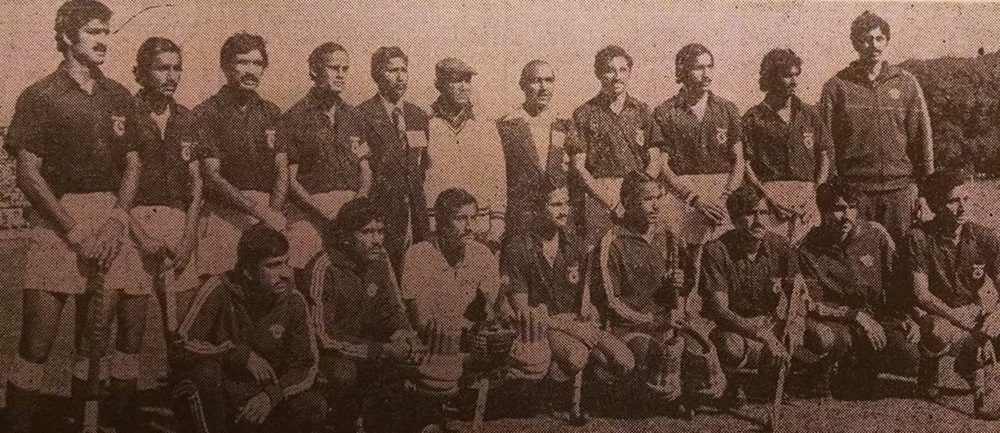Written by: Tanveer Ali
Posted on: September 23, 2024 |  | 中文
| 中文
Pakistan hockey team after winning the 1994 World Cup
Pakistan is one of the most successful hockey teams in the world, with four World Cup titles and three Olympic gold medals. This glorious journey began when the national team won the Olympic gold for the first time in 1960 in Rome, paving the way for further triumphs in 1968 in Mexico City, and in 1984 in Los Angeles. These victories demonstrated not only the talent and hard work of the players but also the mastery of the coaches responsible for getting the best out of its players and making strategies. Besides the Olympics, Pakistan has performed exceptionally well in the Asian Games, winning a total of eight gold medals, showcasing consistent performance over several decades.
The high point of Pakistan Hockey, however, came in the Hockey World Cups, where Pakistan has clinched the championship four times: in 1971, 1978, 1982 and 1994. These achievements have not only motivated future generations of players but have also established great traditions that reflect the cultural importance of hockey in Pakistan. The 1978 win stands out, as it inspired sports other than hockey, in particular Argentina’s Football, leading to its first-ever World Cup win.

The 16-member World Cup-winning Pakistan hockey team in 1978, pictured at the Polo Ground, Buenos Aires, Argentina. (Photo from the Dawn Archives)
Pakistan’s victory in the 1978 Hockey World Cup, held in Buenos Aires, marked a significant moment for the history of Pakistan hockey. The innovative playing style taught by coach Abdul Waheed Khan to the Pakistan team particularly inspired the Argentina football squad as they prepared for the FIFA World Cup later that year. This deep-rooted relationship was well summarized by Luis César Menotti, the head coach of Argentina’s football team, in a letter to Khan. He celebrated the victory of the Pakistani team as a triumph for Pakistan and described it as an inspiration for the Argentinian team, which would clinch their sole FIFA World Cup title later that year.
Menotti acknowledged that the spirit and strategy with which the Pakistani hockey team approached the game ignited passion in his own team, urging them to act with equal aggression and tactical awareness. Notably, the Pakistani attacking strategy, referred to as the “double attack,” involved shifting play and attack from one side of the field to the other. If a move from the right side failed, the team would immediately switch and attack from the left side, as the opponents’ defence would likely be stationed on the side being targeted first. This dynamic approach not only overloaded the defence but also opened up gaps for attacks, marking a significant evolution in the way teams approached hockey.
For this reason, Menotti embraced aspects of this strategy and applied them to the Argentinian team. This flexibility was instrumental in the success of the Argentine team, as demonstrated during the FIFA World Cup. Comparing the achievements of the hockey team and the football team brought to light a relationship between the two sports, showing that success in one can influence others.
The strategy employed by the Pakistan hockey team in the 1978 World Cup, using the double attack, has influenced both hockey and football. This approach, emphasizing free movement and the availability of options, led hockey teams to adopt more spirited and synchronized attacking positions. This has been practiced by famous football managers like Pep Guardiola in their teams, including Barcelona, Bayern Munich and now Manchester City, where overlapping player positions create numerous attacking options. Both overlapping runs and spacing are tactics reminiscent of the double attack, fostering fast thinking and flexible courses of action that form the basis of a new school of offense in football.
Reviving the historical glory of Pakistan hockey now seems a distant dream, as the sport faces numerous administrative challenges and lack of proper funding. The national team has struggled to qualify for major tournaments in the last two decades, and has displayed dismal performances when compared to their previous prowess. Key reasons for this decline include poor funding for grassroot development, mismanagement within the Pakistan Hockey Federation (PHF), and a lack of contemporary coaching facilities. Nevertheless, revival is possible, and here is how it can be done.
Focusing on grassroot development, professionalizing governance within the PHF, and improving training facilities will create the conditions necessary for rebuilding the sport. Schools and local clubs that invest in nurturing talent are essential for revitalizing hockey in Pakistan, drawing inspiration from other successful hockey nations. Additionally, supporting women’s hockey can open new sources of talent and help develop young stars. By embracing a comprehensive approach to revitalization, Pakistan can aim to restore its position among the leaders in the international hockey arena.
Overall, the history of Pakistan hockey is filled with resilience and inspiration, and the lessons learned from the past can guide the way forward. The Pakistan-Argentina episode illustrates the spirit of sportsmanship and cooperation during the 1978 World Cup, exemplifying how one sport can deeply impact another. If all relevant departments and teams work together with a clear plan, Pakistan can revive its hockey legacy and aspire to once again reach the pinnacle of the sport.
You may also like: